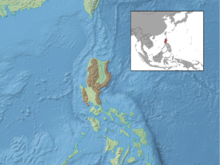| Northern Luzon giant cloud rat | |
|---|---|

| |
| Conservation status | |
 Least Concern (IUCN 3.1) | |
| Scientific classification | |
| Domain: | Eukaryota |
| Kingdom: | Animalia |
| Phylum: | Chordata |
| Class: | Mammalia |
| Order: | Rodentia |
| Family: | Muridae |
| Genus: | Phloeomys |
| Species: | P. pallidus |
| Binomial name | |
| Phloeomys pallidus Nehring, 1890 | |

| |
The northern Luzon giant cloud rat (Phloeomys pallidus) or northern Luzon slender-tailed cloud rat, also known as bu-ot in Filipino, is a large species of rodent in the family Muridae. It is only found in Luzon, the Philippines.
Appearance
This very large rodent weighs 1.9–2.6 kg (4.2–5.7 lb) and is 75–77 cm (29.5–30.5 in) long, including its tail. The colour of its relatively long pelage, which also covers the tail, is highly variable, but usually it is mostly very pale brown-grey or white with some dark brown or black patches. They often have a black mask and collar, but can also be entirely white. The only other member of the genus Phloeomys, the southern Luzon giant cloud rat (P. cumingi), has a more southerly distribution, generally is smaller (although with some overlap) and it is entirely dark brown; however, the occasional brown Northern Luzon giant cloud rat has been reported in the Mountain Province, and the taxonomic limits between the two Phloeomys are not fully resolved.
Distribution and habitat

The northern Luzon giant cloud rat is only found in northern and central part of Luzon, the Philippines. It is found in at least 12 provinces. The northern Luzon giant cloud rat prefers forest and scrub, but also occurs in degraded habitats such as plantations. It occurs from sea level to an altitude of about 2,200 metres (7,200 ft). In some areas it overlaps with the rarer giant bushy-tailed cloud rat, but that species mainly occurs at higher altitudes than the northern Luzon giant cloud rat.
Behavior
The northern Luzon giant cloud rat is nocturnal and feeds on various types of vegetation. Because of its relatively large size, it does not enter traditional small-mammal traps and this has limited research in the species.
Reproduction
Northern Luzon giant cloud rats often live in pairs with one or two dependent young. They give birth in hollow boles of trees (standing or fallen) or in burrows in the ground. The sperm head of northern Luzon giant cloud rat has a short apical hook, with the sperm tail attached off-center basally. The tail of the sperm is about 127 μm long.
Conservation status
The northern Luzon giant cloud rat can cause extensive damage to rice crops and are sometimes considered a pest. They are regularly hunted for food in the Sierra Madre. It has been extirpated from some regions because of hunting, but overall it appears to be able to withstand hunting pressure and in general it remains common and widespread.
See also
References
- ^ Heaney, L.; Balete, D.; Ong, P. (2016). "Phloeomys pallidus". IUCN Red List of Threatened Species. 2016: e.T17004A22454049. doi:10.2305/IUCN.UK.2016-2.RLTS.T17004A22454049.en. Retrieved 12 November 2021.
- ^ Oliver; et al. (1993). "Cloud rats in the Philippines — preliminary report on distribution and status". Oryx. 27: 41–48. doi:10.1017/s0030605300023942.
- ^ "Phloeomys pallidus". Field Museum of Natural History, Synopsis of Philippine Mammals. 2010. Retrieved 10 June 2011.
- "Phloeomys cumingi". Field Museum of Natural History, Synopsis of Philippine Mammals. 2010. Retrieved 4 January 2020.
- Duya; et al. (2011). "Chapter 4: Diversity of Small Mammals in Montane and Mossy Forests on Mount Cetaceo, Cagayan Province, Luzon". Fieldiana: Life and Earth Sciences. 2: 88–95. doi:10.3158/2158-5520-2.1.88. S2CID 129507111.
- ^ Breed; et al. (2010). "The spermatozoon of the Old Endemic Australo-Papuan and Philippine rodents--its morphological diversity and evolution". Acta Zoologica. 91 (3): 279–294. doi:10.1111/j.1463-6395.2009.00407.x.
- Singleton; Ravindra & Sebastian (2008). Philippine Rats: ecology and management. PhilRice.
- Duya; et al. (2007). "Report on a Survey of Mammals of the Sierra Madre Rance, Luzon Island, Philippines". Banwa. 4: 41–68.
| Extant species of subfamily Murinae (Oenomys–Pithecheir) | |||||||||||||
|---|---|---|---|---|---|---|---|---|---|---|---|---|---|
| Oenomys Division | |||||||||||||
| Phloeomys Division |
| ||||||||||||
| Pithecheir Division |
| ||||||||||||
| Taxon identifiers | |
|---|---|
| Phloeomys pallidus | |